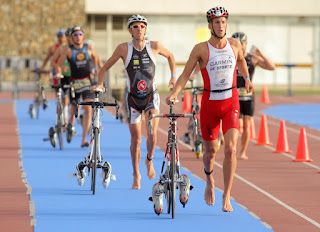 Triathlon requires discipline, time, and effort for one to become a age group competitor and a Kona contender. In addition to mental coaching in triathlon, triathletes have to train for many hours to ensure their bodies are well conditioned to compete.
Triathlon requires discipline, time, and effort for one to become a age group competitor and a Kona contender. In addition to mental coaching in triathlon, triathletes have to train for many hours to ensure their bodies are well conditioned to compete.
While competitive triathlon training requires a high level of investment (both time and energy,) the following suggestions might help you further succeed as a better triathlete.
1. Spend more time focusing on recovery
Recovering allows the body to be at it best performance. Ensuring you have enough rest days between your training activities is important for conditioning your body for optional triathlon training the next time around.When you are involved in heavy triathlon training, you are likely to suffer from some sort of exhausted muscle tissue quality. This, when not worked-on, can result in the accumulation of scar tissue, adhesion, and knots. Soft tissue work improves the tissue quality by concentrating on the "trigger points". This way, your performance as a better triathlete is optimized.
Stretching should also be incorporated in the recovery as it increases muscle tone, resilience and strength. After a lot of muscular efforts, stretching decompresses your joints and back hence accelerating recovery of muscles, joints, and tendons.
Finally, a balanced meal with all the nutrients required for recovery ensures a proper and speedy recovery. The right nutrition refuels your muscles, manufactures new muscle protein, boasts the efforts of the immune system in recovering from the challenging exercises, and replaces the fluid lost. All these activities restore the body to its prime condition.
2. Work with a triathlon coach
 One of the major benefits of triathlon coaching is getting feedback, direction, and actionable insight on aspects of technical training as well as programing. While trained triathletes are well versed with these techniques and can even prepare their own training plans, there is still great value in hiring a triathlon coach.
One of the major benefits of triathlon coaching is getting feedback, direction, and actionable insight on aspects of technical training as well as programing. While trained triathletes are well versed with these techniques and can even prepare their own training plans, there is still great value in hiring a triathlon coach.A triathlon coach acts as a person who is removed from the training and competition's emotional attachment, and thus can better effectively manage the structure, intensity, and purpose of your training program to prevent over-fatigue and overtraining. A triathlon coach can be objective in how you manage your rest days and hard workout. In most cases, triathlon coaches will be handy in giving you a second opinion when you doubt yourself.
Most of the top triathlon training coaches also offer personalized structured training programs instead of the standard training outline. Through matching computerized data with your performance, the coach has the ability to determine your current abilities and your future targets. The structured training targets your weaknesses with the full information of the manner in which you respond to different stresses. Further, the coach is important in providing race day tactics through a study of your opponents and your strengths and weaknesses.
3. Never stop learning
New techniques in triathlon training, programing, and skills and strength/injury prevention. Sports scientists have been carrying out research in the bid to improve the manner in which athletes train. Over time, structured triathlon programing has evolved and changes made to the manner in which the athletes train.While it is the duty of the coaches to ensure that their athletes are updated on the new techniques that have been tried and tested, it would not hurt if an athlete found something the coach may have missed. In most cases, athletes only discover these new techniques when their counterparts defeat them in competition. A successful triathlete must therefore keep reading to remain ahead of competitors and supplement what the coach knows.


